LIVE: Bolivia’s presidential election heads to runoff
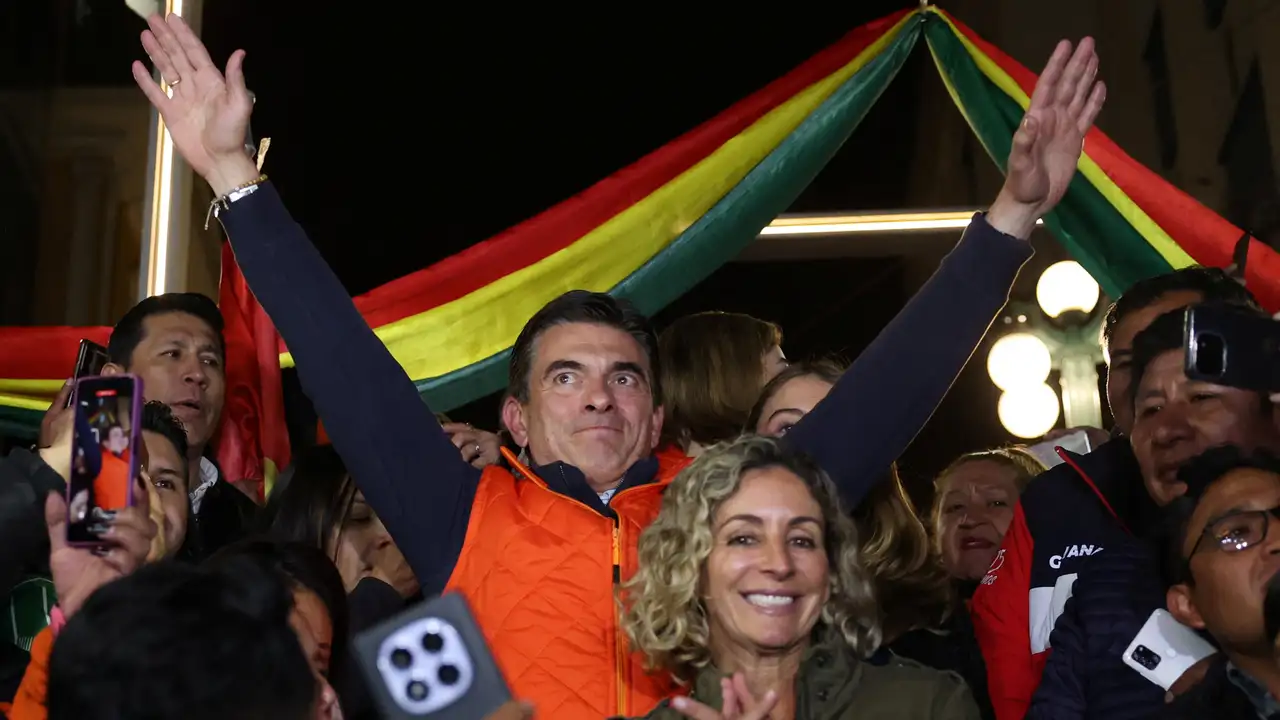
Follow Global South World’s live coverage of Bolivia’s August 17, general election.
Live Updates
This is the end of our live coverage of the 2025 Bolivia general elections. Preliminary results released by the TSE, shows that no candidate secured enough to be declared winner of the the presidential. After 90% of the vote count, Rodrigo Paz Pereira of the PDC led with 32.08% followed by Jorge “Tuto” Quiroga of the Libre party with 26.94%. Follow Global South World’s news updates as the South American nation heads to a runoff to elect a new president in October.
02:45 GMT: Doria Medina concedes defeat, pledges support for Rodrigo Paz in Bolivia’s elections
Opposition leader Samuel Doria Medina, candidate of Alianza Unidad, conceded defeat after finishing third in Bolivia’s 2025 presidential race. In a statement on Sunday night, he acknowledged the preliminary results and pledged his full support to Rodrigo Paz Pereira of the Christian Democratic Party (PDC), who will face Jorge “Tuto” Quiroga in the October 19 runoff. Doria Medina’s endorsement is expected to play a key role in shaping alliances ahead of the decisive second round.
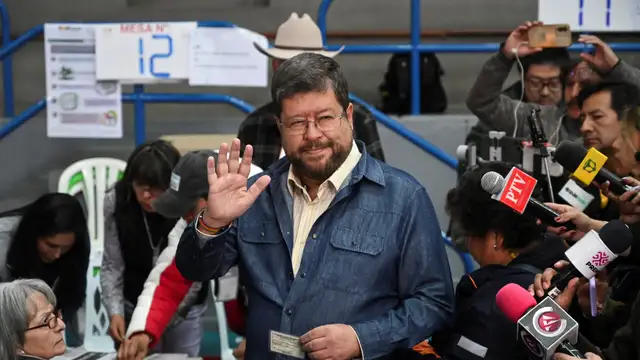
02:31 GMT: Bolivia’s presidential race heads to runoff as preliminary results announced
According to preliminary results released by the Supreme Electoral Tribunal (TSE), Bolivia’s 2025 presidential election will go to a runoff on October 19. With over 90% of votes counted, Rodrigo Paz Pereira of the Christian Democratic Party (PDC) leads with 32.08%, followed by Jorge “Tuto” Quiroga of the Libre party with 26.94%. Businessman Samuel Doria Medina of Alianza Unidad, once a frontrunner in polls, finished third and conceded, pledging support for Paz.
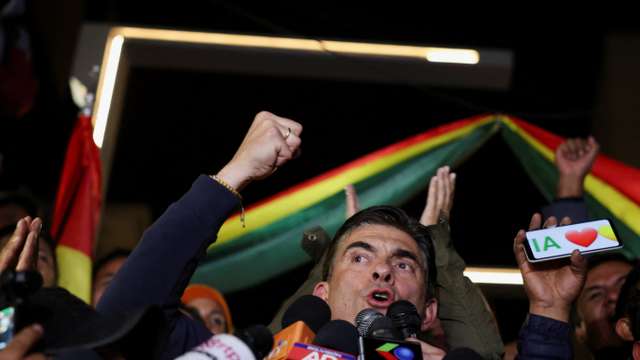
00:32 GMT: Preliminary results place Rodrigo Paz of PDC in the lead, followed by Tuto Quiroga
Early vote counts from Bolivia’s 2025 general elections show Rodrigo Paz, candidate of the Christian Democratic Party (PDC), as a surprise frontrunner. He is trailed by former president Jorge “Tuto” Quiroga, running under the Libre banner. These preliminary figures suggest an unexpected shift in voter preferences.
21:44 GMT: Bolivia’s Supreme Electoral Tribunal (TSE) convenes plenary session
The Supreme Electoral Tribunal officially opened its plenary session. Authorities announced that preliminary results from overseas voting are expected to be released around 01:00 GMT, marking the first official updates of Bolivia’s 2025 general elections.
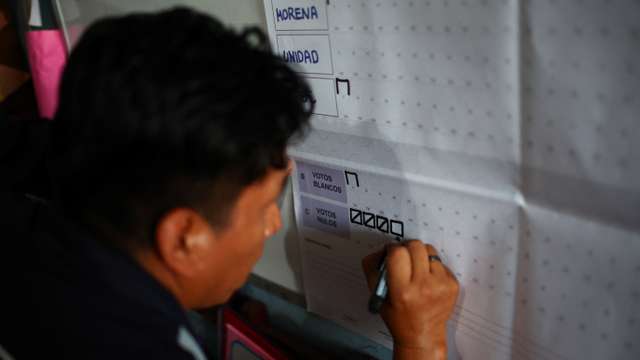
21:06 GMT: Electoral jurors begin ballot counting in Bolivia
Electoral jurors have entered the final stretch of their duties, starting the ballot counting phase after completing their work at the polling stations. This marks the beginning of the meticulous process to ensure transparency and accuracy in Bolivia’s 2025 general elections.
20:00 GMT: Polls close in Bolivia’s 2025 elections
Polling stations across Bolivia closed at the scheduled time of 4:00 p.m. local, officially marking the end of voting in the 2025 general elections. The country now enters the vote-counting phase, with electoral authorities overseeing the process. Turnout was reported to be high, and observers highlighted a generally peaceful election day.
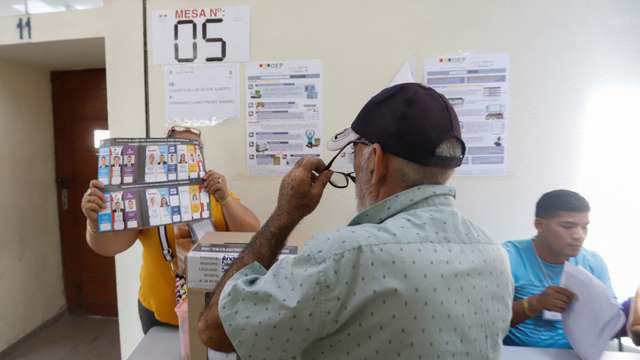
19:02 GMT: Presidential candidate Jorge “Tuto” Quiroga casts his vote in La Paz
Jorge “Tuto” Quiroga, presidential candidate for the LIBRE alliance, voted in La Paz this afternoon amid strong citizen expectation. His participation drew attention from both supporters and observers, marking a significant moment in the capital during election day.
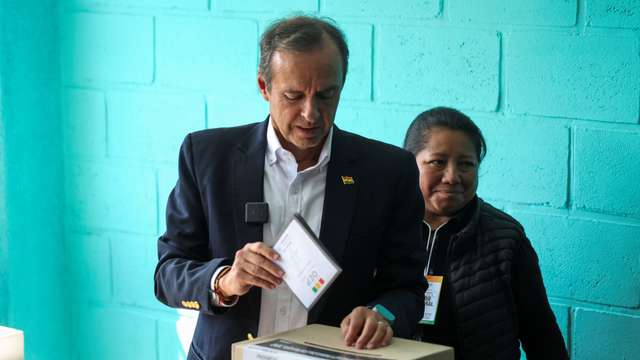
18:35 GMT: Departmental Electoral Tribunal reports smooth voting process
The Departmental Electoral Tribunal (TED) issued a positive mid-day assessment of Bolivia’s general elections, noting that the process has been carried out normally across 6,346 polling tables. Authorities reported only one incident in the Tropic region, which they described as isolated and under control.
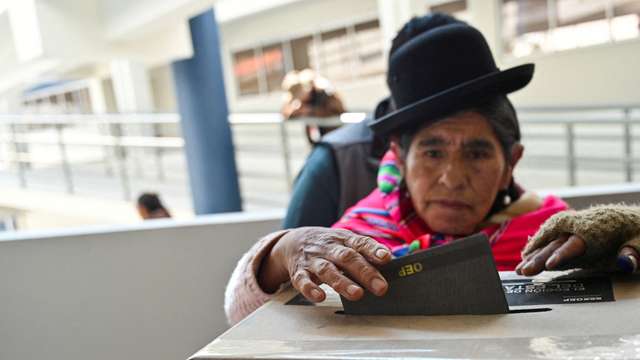
17:44 GMT: COPPPAL mission hails high voter turnout in Bolivia’s elections.
Gerardo Morris, representing the Permanent Conference of Political Parties of Latin America and the Caribbean, highlighted the massive participation as a clear sign of democratic commitment.
17:04 GMT: Manfred Reyes Villa (APB-Súmate) vows close monitoring of election process
Presidential candidate Manfred Reyes Villa of the APB-Súmate alliance expressed concerns about potential irregularities during the voting process. “Be careful that there’s nothing slightly off going on. We will be doing a full follow-up,” he said, emphasizing his commitment to closely overseeing the election.
16:48 GMT: Andrónico Rodríguez attacked with stones after voting
Presidential candidate of the Alianza Popular, Andrónico Rodríguez, was reportedly attacked with stones immediately after casting his vote. The incident took place amid a tense atmosphere at the polling station, highlighting the high political stakes of the day.
16:50 GMT: Johnny Fernández heckled while voting in Santa Cruz
The mayor of Santa Cruz and presidential candidate, Johnny Fernández, was heckled by a group of neighbors when he went to vote at Villa Fátima School, located in the Fátima neighborhood of the city. Footage shows that some of the people accompanying the mayor almost came to blows with those confronting Fernández. The incident occurred when the mayor defended a woman who was being insulted by other attendees. After the altercation, Fernández described the situation as a “commotion” caused by his intervention in defense of the woman.
16:25 GMT: VP candidate Lupo casts his vote, dismisses “last-ditch efforts” from Evo supporters
Vice-presidential candidate Luis Lupo, representing Unidad Nacional, cast his vote and described the behavior of Evo Morales’s supporters as “patadas de ahogado,” a Spanish expression meaning desperate last-ditch efforts.
15:40 GMT: EU observers call Bolivia’s election day peaceful and well-organised.
The European Union (EU) Election Observation Mission described the first half of Bolivia’s election day as calm, orderly, and free of major incidents.
Mission chief Davor Stier, speaking from La Paz, said that the 120 EU observers deployed across the country’s nine departments reported polling stations opened on time, with voting materials delivered promptly and logistics handled effectively by the Supreme Electoral Tribunal (TSE) and departmental courts.
“So far, the impression is that it has been a well-organized, peaceful day, where Bolivian citizens can freely and safely exercise their right to vote,” Stier noted.
15:36 GMT: Peaceful voting underway in Santa Cruz.
Election day in Santa Cruz began at 8:00 a.m., with steady voter turnout reported through the morning. By nearly noon, citizens continued arriving at polling stations to cast their ballots, and no incidents had been reported.
The department of Santa Cruz has 2,071,967 eligible voters, distributed across 9,115 polling tables and 1,124 polling stations.
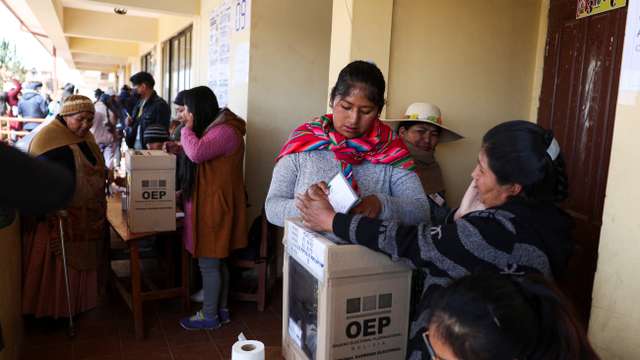
14:39 GMT: APB-Súmate vice-presidential candidate Juan Carlos Medrano votes in Santa Cruz de la Sierra.
Juan Carlos Medrano, vice-presidential candidate for the APB-Súmate party, cast his ballot at the UE 24 de Septiembre polling station in Santa Cruz de la Sierra. He arrived with his wife, both maintaining a calm demeanor as they greeted fellow voters.
After voting, Medrano called for integrity in the electoral process. “We ask for transparency from all candidates. We ask the electoral body to ensure that people’s votes are not manipulated today and that Bolivians can freely choose,” he told reporters.
14:36 GMT: OAS electoral observers monitor Bolivia’s vote.
The OAS Electoral Observation Mission in Bolivia, led by Juan Fernando Cristo Bustos, began its work on Sunday, monitoring the opening and development of the elections at precincts across the country. Cristo Bustos also attended the official opening ceremony organized by the Supreme Electoral Tribunal (TSE) in La Paz, where he reaffirmed the mission’s commitment to ensuring a transparent and democratic process.
The mission is composed of 87 international observers from 19 countries, who are tasked with monitoring election day as more than 7.9 million Bolivians head to the polls.
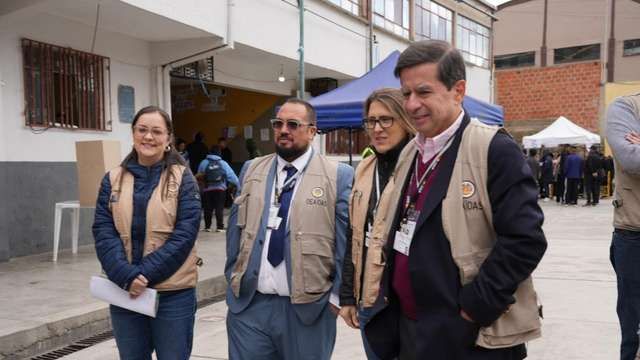
14:20 GMT: Former president Evo Morales votes in Chapare without a press statement.
Former president Evo Morales cast his vote in his coca-growing stronghold of Chapare, central Bolivia, accompanied by just over fifty of his so-called “union police.” He left the polling station quietly, without speaking to the press. The vote took place peacefully despite earlier threats of disruption from Morales’ supporters. Notably, there was no official police presence at the site. Morales, who has urged Bolivians to cast null ballots as a form of “democratic rebellion,” had actively campaigned for null votes in the run-up to the election.
13:00 GMT: Unidad Alliance presidential candidate Samuel Doria Medina votes in La Paz.
Businessman and Unidad Alliance presidential candidate Samuel Doria Medina cast his ballot at 9:00 a.m. on Sunday at the Franco Boliviano School in southern La Paz.
After voting, Doria Medina alleged that on Saturday his party’s computing center had been targeted by Evo Morales supporters. “Yesterday they tried to break into our computing center, claiming that fraud was being prepared when in fact it is public knowledge that all parties carry out electoral monitoring,” he said.
12:45 GMT: Alianza Libre’s Branko Marinković votes in Santa Cruz de la Sierra alongside family and party leaders.
Branko Marinković, candidate for first senator with the Alianza Libre party, cast his vote in Santa Cruz de la Sierra accompanied by his wife, Nicole Daulsberg, and their son. He was also joined by his party’s presidential and vice-presidential candidates, Jorge “Tuto” Quiroga and Juan Pablo Velasco, who came to show their support.
Meanwhile, at the American School polling station, where judges were missing, Marinković’s son stepped in as a volunteer judge. “We voted at the same polling station, and he’s volunteering to be a polling station judge. These are the kinds of surprises that happen, but what matters is the civility, the family-oriented civility, to support the vote,” Marinković said.
12:30 GMT: MAS-IPSP presidential candidate Carlos Eduardo del Castillo casts his vote in Santa Cruz de la Sierra amid protests.
Presidential candidate Carlos Eduardo del Castillo del Carpio of the Movement Toward Socialism (MAS-IPSP) arrived shortly after polls opened to cast his ballot at the Caritas Union (UE) polling station in southern Santa Cruz de la Sierra. He appeared calm and composed as he entered alone, but the atmosphere quickly turned tense when some citizens at the site began booing him. Confronted with shouts and protests, Del Castillo chose not to give any statements to the press.
12:15 GMT: Vice-presidential candidate Juan Pablo Velasco votes in Santa Cruz de la Sierra alongside presidential hopeful Jorge “Tuto” Quiroga.
Vice-presidential candidate Juan Pablo Velasco of the Alianza Libre party arrived a little after 8am at the Colegio Nacional Salesiano in Santa Cruz de la Sierra, his designated polling station. He was accompanied by Jorge “Tuto” Quiroga, the party’s presidential candidate. “We’re starting early, exercising this right,” Velasco told reporters. “We invite Bolivians to go out and vote, to do so peacefully, so this is a calm day. Bolivia needs democracy, Bolivia needs results. We are confident and at peace.”
12:15 GMT: President Luis Arce cast his vote at the Miguel de Cervantes school in La Paz’s Miraflores district.
"Despite those who believed we wouldn't reach this day and despite those who didn't want this election day to come, we have happily achieved it thanks to all the efforts we have made from the government," Arce told reporters.
12:00 GMT: The Supreme Electoral Tribunal (TSE) officially opened Bolivia’s election day.
The interim president of the TSE stressed transparency and trust in the process. “Let there be no doubt about our honesty and our good faith,” said TSE president Óscar Hassenteufel, joined by authorities and international observers at the opening ceremony. Rejecting allegations of “fraud or manipulation” as “unfair,” Hassenteufel urged political actors to respect the outcome of the vote. “Democracy is honored when it is won and when the sovereign decision of the people is respected,” he said, calling on all candidates to accept the results “with nobility.”
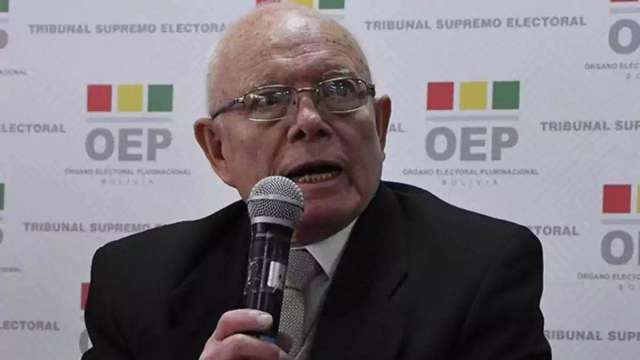
12:00 GMT: Voting has officially begun in the first round of Bolivia’s presidential election, with early voters already queuing to cast their ballots in La Paz.
Polls are expected to open at 8:00 a.m. (1200 GMT) and close at 4:00 p.m. local time across all polling centres.
Background
More than 7 million voters head to the polls across the country’s nine departments to elect the President and Vice President of Bolivia, 130 members of the Chamber of Deputies, and 36 members of the Chamber of Senators, making up the 166-seat Plurinational Legislative Assembly. The elections could mark the potential end of nearly 20 years of rule by the leftist Movimiento al Socialismo (MAS).
A new direction for Bolivia: leading VP candidates set out agendas to Global South World
Bolivia enters its 2025 election under the weight of fuel shortages, a distorted currency market, and rising prices that have strained households and deepened frustration. For the first time in over two decades, economically liberal candidates lead the race, which indicates a potential break from the socialist governments of Evo Morales and Luis Arce. The contest has narrowed around two alliances: Jorge “Tuto” Quiroga’s LIBRE bloc, running on promises of radical change and a pro-business agenda, and Samuel Doria Medina’s Unidad coalition, which presents itself as a pragmatic “radical center” alternative. Both camps offer sharply different faces of economic liberalism but agree on the urgency of stabilizing Bolivia’s economy and redefining its place in the region.
Quiroga’s running mate, tech entrepreneur Juan Pablo Velasco, embodies LIBRE’s appeal to younger voters and pledges to modernize the state through digital reforms, export liberalization, and renewed ties with multilateral lenders. Meanwhile, Unidad’s vice-presidential pick, economist José Luis Lupo, brings decades of experience in international finance and government, proposing a $5 billion stabilisation plan, judicial reform, and investment-friendly laws. Together, these tickets represent a realignment in Bolivia’s political compass, with voters facing a choice not between left and right, but between two competing visions of market-oriented reform.
Last Election (October 18, 2020):
Luis Arce of the Movement for Socialism (MAS) secured a decisive first-round victory with 55.1% of the vote. Former president Carlos Mesa, representing Comunidad Ciudadana, came second with 28.8%, while right-wing candidate Luis Fernando Camacho of Creemos placed third with 14%. Voter turnout was exceptionally high at 88%.
Presidential candidates
A total of 10 presidential candidates registered to contest for the presidency. However, only about seven have made an impression thus far. Leading in the polls is Samuel Doria Medina, a wealthy businessman and three-time presidential candidate running as a pro-business alternative.
Also prominent is Jorge “Tuto” Quiroga, a former president with deep ties to international policy circles and decades of experience in right-wing politics. They are joined by Manfred Reyes Villa, the mayor of Cochabamba whose political comeback has overcome past legal controversies, and Rodrigo Paz Pereira, a senator from Tarija and son of a former president, who represents the Christian Democrats.
The left and MAS-aligned camp is represented by younger candidates seeking to extend the party’s influence. Andrónico Rodríguez, 36, a cocalero leader and Senate president, is running under the Alianza Popular banner and appeals to MAS’s younger base. The official MAS candidate is Eduardo del Castillo, a former interior minister known for hardline security policies. Meanwhile, Eva Copa, the mayor of El Alto and a former MAS senator, is challenging her old party with the National Renovation Movement (Morena), leveraging her grassroots popularity and independent image.
Electoral process
The president and vice president of Bolivia are elected together on a single ballot. To win outright, a candidate must secure either more than 50% of the vote, or at least 40% with a 10-point lead over the nearest rival. If neither threshold is reached, a runoff election is held. Both offices carry five-year terms. In May 2025, the Constitutional Court upheld a ruling barring former President Evo Morales from running again, affirming a two-term limit for the presidency.
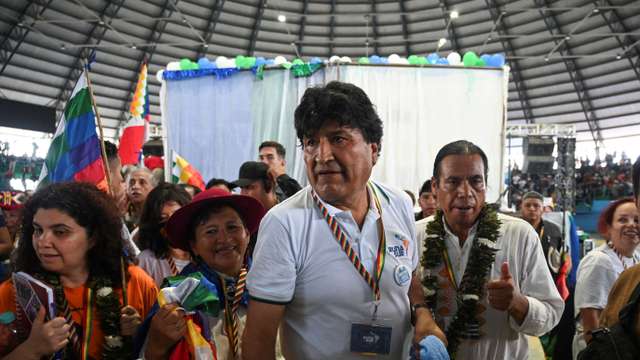
The Chamber of Deputies is elected through a mixed system for five-year terms, renewable once. Half of the deputies are chosen directly from single-member districts, while the other half are allocated through proportional representation based on national party lists headed by presidential, vice-presidential, and senatorial candidates. Seven seats are reserved for representatives of Indigenous peoples.
The Chamber of Senators is elected entirely through proportional representation. Senators also serve five-year terms, renewable once.
Declaration of votes
The electoral tribunal plans to release around 80% of preliminary results on election night, with the full official results expected within seven days.
This story is written and edited by the Global South World team, you can contact us here.